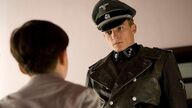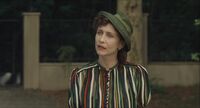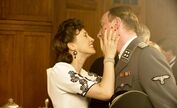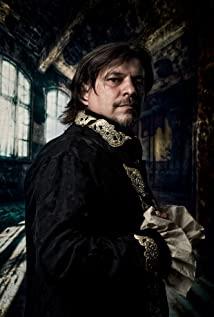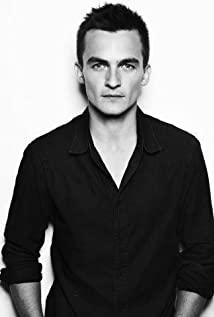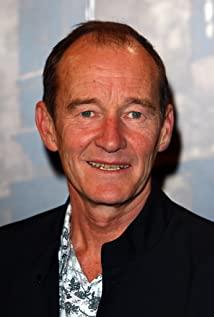"Childhood is measured out by sounds and smells and sights, before the dark hour of reason grows. "
"Before the advent of dark reason, hearing, smell and vision were used to measure childhood."
At first in Berlin, the sun was shining brightly, Bruno opened his hands and crossed the street in a flying pose with his partner. Next to him was the Jew who was driven into the truck by the soldiers. He arrived home, parted, and heard the news that he was leaving.
At that time, the older sister wanted to leave and the younger brother wanted to stay.
And in the end, the same is true.
grandmother.
The role of grandma can almost be said to meet the ending from the beginning. She is the person who stands firmly on the side of "equality" in the entire film. She stuns the commander as soon as she meets at the banquet, revealing opposition and dissatisfaction between the lines. She is not like her mother, she can see clearly from start to finish.
Not surprisingly, the grandma did not come after the call. And what impressed me was what the two adult men said at the dinner table after my grandfather came: "Grandma is sick, and she is very sick."
Maybe I was too sensitive, but I always felt that the word "illness" was a kind of vague reference, referring to grandma's "wrong" position.
I didn't understand the card at the funeral, but it must have belonged to the Nazis. Very ironic.
Pavel.
This was Bruno's first contact with a person in striped pajamas. He sat in the corner of the kitchen and peeled potatoes silently, like a quiet shadow, which was one of the reasons why his mother accused his father. But when he was instructed to pick the tires for Bruno, he smiled kindly and kindly at the boy; he helped the boy who fell from the swing. Four gentle and patient comforts, and the sentence that forced the understatement to be a doctor before, but was misunderstood. Without saying a word, bowing his head and continuing to work... These quiet and fragmented scenes are a kind of silent narration, and finally disappeared in the brutal beating.
It's just a sentence "He won't be back."
The potato peeler in the kitchen changed. There is no impact.
Then say father. Father is undoubtedly the coldest-blooded and majestic man in this play. He is the commander aloft, unsmiling, but it is not difficult to see how much he cares about his family-talking with Bruno, trying his best to explain when arguing with his wife again and again, and finally choosing the ending for his family to leave.
In many cases, or in general, there will be no absolute bad guys. My father always believed that he was right, for the country, for the younger generation, and for a brighter future. He is doing what he thinks is right. I don't know how he felt when he finally followed the dog to find his son, or how he looked at the gas chamber and cried out.
But I know that he will be guilty all his life. I will never live well in my life.
As for the mother who rebelled from the unknown to the known, she initially thought that her husband would take the family away and go to a safe place. She thought that the next door was nothing more than a labor camp, but she also carefully maintained the innocent world of the children. She is a kind of mother I like very much, tough, kind-hearted, and reasonable.
But also very weak. Her actions: changing servants, removing cards, leaving the concentration camp, all must get permission from her husband.
She isolates the children from the Jews as much as possible, and isolates them from the cruel world, but she will not scold Pavel who bandaged her son, but at the same time she will not intercede for them.
Very satisfactory.
What impressed me more was that after the tutor came, Bruno lied to go to school to bring food to his friends, and his mother said with a serious face that he wanted to see what book it was. I think at that moment my mother was worried, even frightened. But when the child confessed to a lie, she didn't blame him, but smiled softly as if he was relieved.
Where is it? Except for the protagonist, let's talk about my sister. My sister didn't really impress me very deeply. From the very beginning, the lieutenant general, the fanaticism and unconditional resistance to the Nazis who thought they were mature from the beginning, are like the response every German child should have after receiving education-Bruno is an outlier. But in the same way, my elder sister also gradually began to understand and began to truly understand the world, from the act of throwing away the ragdoll to hugging her younger brother at night, half helplessly and half concealedly asking him, "Do you really think it's a farm?"
She is growing.
Sim, this little Jewish boy. He is autistic, inferior, and very subtle at the same time. He is "ignorant" and also "knowing." He didn't know why he wore "striped pajamas", why he had to do heavy work, why his grandparents died, and where his father went. But he knew that Bruno's ball could not go to his side, and he knew that he could not find his father when he went out...
He would argue that Bruno gave him food and talked to him, and after being silent for a long time, he finally raised his injured face with his right eye and took the initiative to reach out Bruno to become a friend again. He would not ask "why", nor did he tell what he had experienced. He never complained about what Bruno didn't do, because he knew he was "different" from Bruno.
But what he is like Bruno is that they never touched the cruel truth to death.
Finally, Bruno, I praised his beautiful-eyed actor as soon as he appeared on the stage. He has the weakness of a child and the innocence of a child. He admired his father. He regarded his father as a hero. When he began to question his father but saw the false propaganda film by accident, he hugged his heroic father who had not changed in his eyes. There is joy and pride in that silent hug.
He is an "adventurer", he loves to explore the unknown, he is like a young eagle, because he is young, he is fearless. He ran to the backyard, ran to the fence, and became friends with Sim.
He questioned. He questioned what the teacher said "no Jew is a good person" because it is not like this in his personal experience; he believes that he believes that the next door is a farm, a place where people are happy with a coffee shop and a small restaurant.
He would froze and run away in panic because Sim said he was a Jew; he would conceal the fact that he knew and feed him cake when he was scared, although he would eventually try to remedy it; he would lie in order to achieve his own goals, but He is always happy and optimistic, waiting for me, even in the face of unknown death, he will say "we are here to hide from the rain" and "to take a bath" naive and ironic words.
There are a lot more. For example, in his eyes, prison uniforms are just "striped pajamas" and the serial number is just "games". He will tell Sim, "Wait for you to come to Berlin to find me in the future, after everything is over". The world in his eyes is beautiful, there is no dirty world, only children can see.
But he has no more after.
This film, from the vibrant towering trees with mottled light and shadow, to the blue and sometimes smoky sky, ends in a lifeless confinement room full of striped pajamas.
And the hands clasped twice are under the blue sky, between life and death.
Regarding the ending, I think Bruno’s death is an absolute. Even if he did not die in the gas chamber, he would eventually die someday in the future. Or because he fought for the Jews to the end, like his grandmother; or he chose to compromise with the world and become a soldier like Kotler.
No one is innocent, and no one deserves retribution.
This is "destiny".
View more about The Boy in the Striped Pajamas reviews



